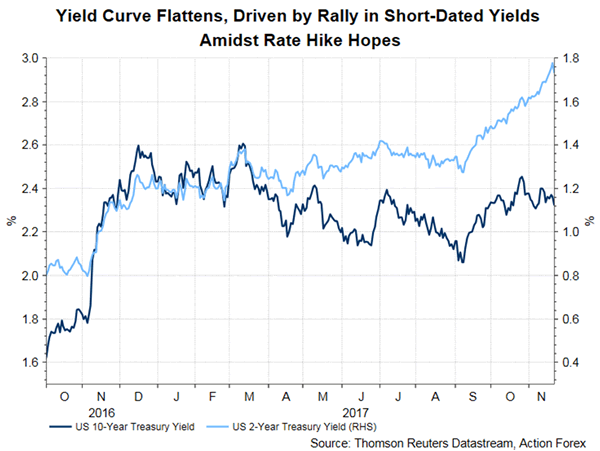The greenback slumped as the FOMC minutes for the November meeting revealed that ‘several’ members were concerned that weak inflation would be persistent, rather than temporary. They highlighted the worries about a ‘a diminished responsiveness of inflation to resource utilization’. Another important message suggested in the minutes is that a December rate hike is almost a done deal with ‘many’ members judging that it is ‘warranted in the near term’ if the macroeconomic data remain steady. Such opinion has outweighed the thought of ‘a few ‘members’ that a rate hike should be delayed. We view the USD selloff might have been over-reacted. Note that the (core) PCE, the Fed’s preferred inflation barometer, has improved, while the October CPI, released after the November meeting, also picked up. We believe the majority of the FOMC still retain the view that weak inflation is transitory.
The minutes indicated more concerns over low inflation. Many members attributed the downside surprise of core inflation to ‘temporary or idiosyncratic factors’. They believed inflation would begin to rise as these factors diminish. ‘Most participants’ retained the view that ‘the cyclical pressures associated with a tightening labor market were likely to show through to higher inflation over the medium term’. However, the minutes revealed a detailed discussion over the possibility of persistent weakness on inflation. As noted, ‘several’ members expressed concerns that ‘persistently weak inflation data could lead to a decline in longer-term inflation expectations or may have done so already’. They noted the ‘diminished responsiveness of inflation to resource utilization, to the possibility that the degree of labor market tightness was less than currently estimated, or to lags in the response of inflation to greater resource utilization as plausible explanations for the continued soft readings on inflation’. The staff ‘slightly’ lowered its core PCE forecasts for this year and the next. Yet, the forecast that inflation would reach 2% in 2019 remains intact.
Despite the abovementioned concerns, ‘many’ members still believed that a rate hike would be ‘warranted in the near term if incoming information left the medium-term outlook broadly unchanged’. Meanwhile, ‘several’ members raised the issue of ‘a potential buildup of financial imbalances’ which could be exacerbated by a prolonged period of low interest rates. Yet, there were still ‘a few’ members who preferred to delay rate increases until there is confirmation that the 2% inflation target would be reached. They warned that further rate hike might risk keeping inflation ‘persistently below +2%’. All in all, the recent solid economic data signal a rate hike in the coming month is a done deal.

